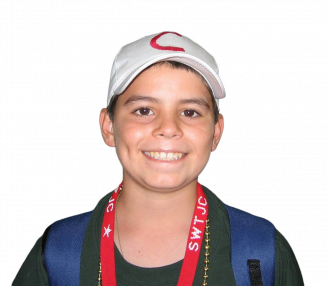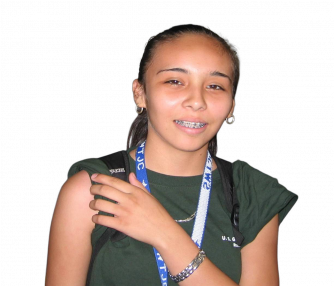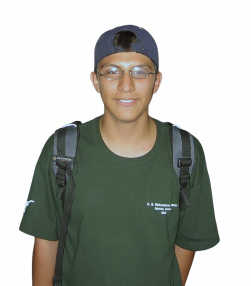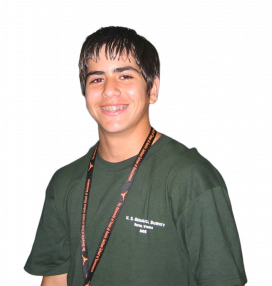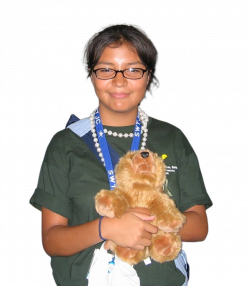GeoFORCE
TURNS
20
GeoFORCE
TURNS
20
The Jackson School’s premier outreach program has introduced hundreds of Texas high schoolers to the geosciences — and changed lives along the way

The Jackson School’s premier outreach program has introduced hundreds of Texas high schoolers to the geosciences — and changed lives along the way
BY ANTON CAPUTO
Twenty years ago, a group of young students, flanked by their parents, nervously waited for a bus at Southwest Texas Junior College.
All were incoming high school freshmen from rural towns in South Texas. In most cases, they were about to enter a series of firsts: first time out of the state, first time on an airplane, and first time away from home without family.
The group of 40 was the inaugural GeoFORCE class. The innovative new program started by the Jackson School of Geosciences was an effort to tackle key issues facing the field: A massive shortage of geologists and geoscientists loomed, and exposure to Earth sciences was becoming ever more rare at the high school level.
The idea was to help reverse the trends by finding bright students in the eighth grade and educating them in the geosciences every summer through high school. The program has since expanded to Houston, Austin and the Rio Grande Valley, but the underserved rural communities of Southwest Texas were the first target.
These students were GeoFORCE’s self-described “guinea pigs,” a moniker many of them still bear with pride. Over the next four years, for two weeks their first summer and a week during the following three, they would learn geology from some of the best educators in the world on trips to Washington, D.C., Virginia, New Mexico, Arizona, the Pacific Northwest, Florida and the Jackson School.
Looking back over the past two decades, it’s obvious from program statistics and growth that GeoFORCE has thrived. But sometimes, the impacts on young lives are best relayed through their stories.
Five of those original students, now in their early 30s and entering midcareer, have shared their thoughts and memories of the program and how it has helped shape the professionals and people they have become.
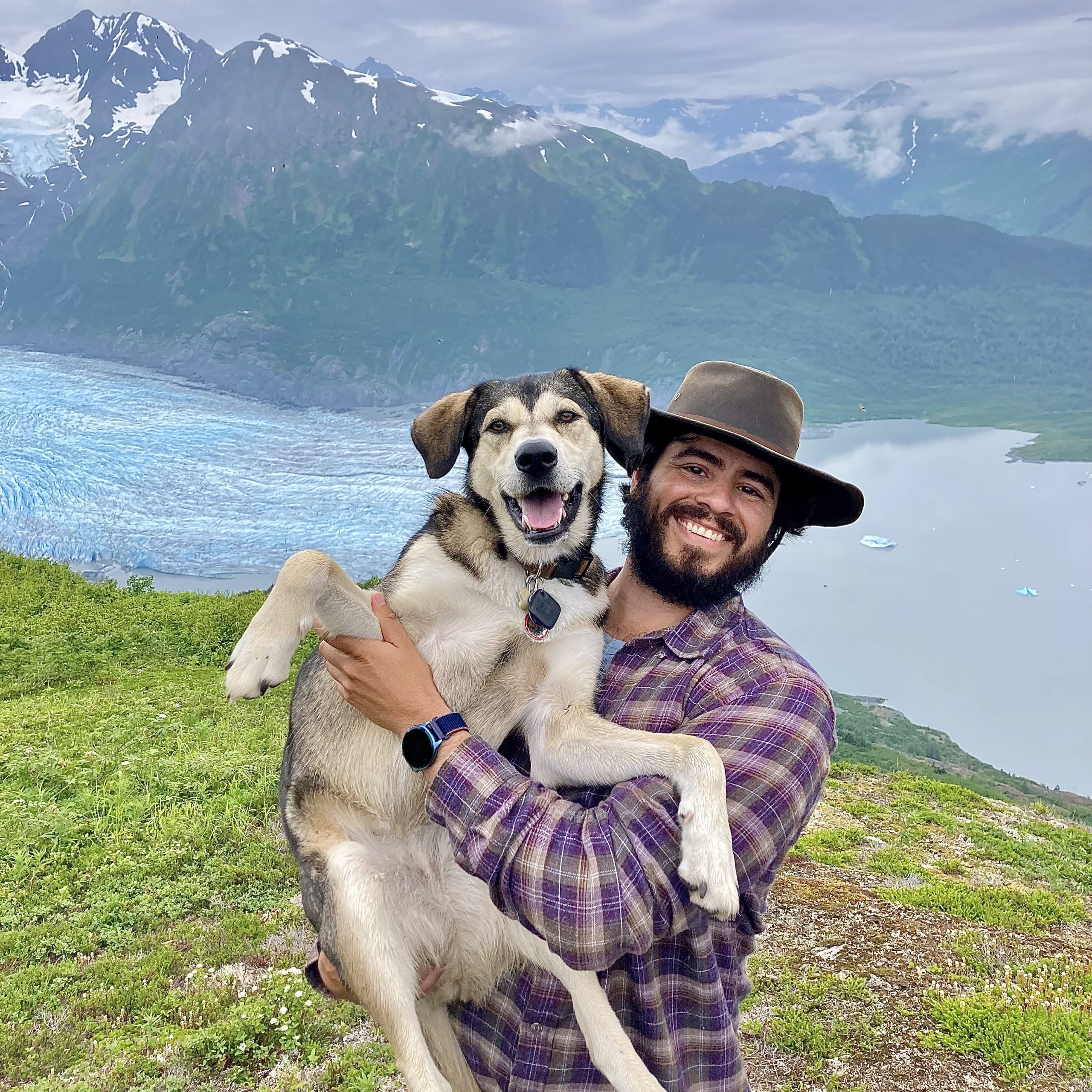
Carlos De La Torre
Hometown: Sabinal
Education: Texas A&M University, B.S. in Wildlife Ecology Conservation with minor in Earth Sciences
Profession: U.S. Forest Service Partnership Coordinator

Carlos De La Torre has spent much of his adult life seeking new places and experiences. He worked two internships for the National Park Service in Grand Teton National Park and Puerto Rico’s San Juan National Historic Site. He spent 27 months in the Peace Corps in Peru. And now — after stops in Washington, D.C. and Maryland — he lives in Alaska, where he is a partnership coordinator for the U.S. Forest Service.
That’s far afield for a kid from Sabinal, Texas.
Yet, when Carlos looks back to his first trip on that GeoFORCE bus 20 years ago, he remembers feeling anything but secure.
12%
of GeoFORCE students have earned a bachelor’s in geoscience.
30x
times the national rate.
60%
of GeoFORCE alumni declare a STEM major in college.
3x
times the national rate.
“It was scary,” he said. “There were so many strangers. There were so many other students. I think I cried for a little bit at the beginning.”
Carlos describes himself as an introverted kid at that time in his life, intimidated by the high-energy students around him and anxious about the whole situation. After a few days, though, as he made friends and got into the groove of the academic work, Carlos’ anxiety eased and his excitement grew. It was a lesson he would take along with him in life.
“That was the first time on my journey to get comfortable with large groups and being on my own,” he said. “You have to explore the world to understand it better.”
GeoFORCE offered Carlos many firsts in life. Given his financial situation, costly travel was not likely. Neither was ready access to higher education. GeoFORCE helped change that.
“I was exposed to what a university looks like,” he said. “It definitely normalized that this is the path we all can take and that you are invited to join.”
That path took Carlos to Texas A&M University where he would major in wildlife ecology and conservation and minor in Earth sciences. College was where Carlos really bloomed, taking active leadership roles in university clubs, joining study abroad programs, and jumping at opportunities to travel for internships and join other outreach programs such as the National Park Service Academy program.
Given his college and professional experiences, Carlos chuckles when thinking back to his days in GeoFORCE, pointing out that most of the young students have no concept of the logistical feats and hard work that go into providing them with world class educational opportunities.
“When you’re a student, there is zero understanding of all the behind-the-scenes work,” he said. “All of these efforts that everybody puts into this, from the drivers of the buses, to all the administrative tasks, to the teachers — I think everyone should appreciate that they all took part in the bigger picture of having a positive impact on youth.”
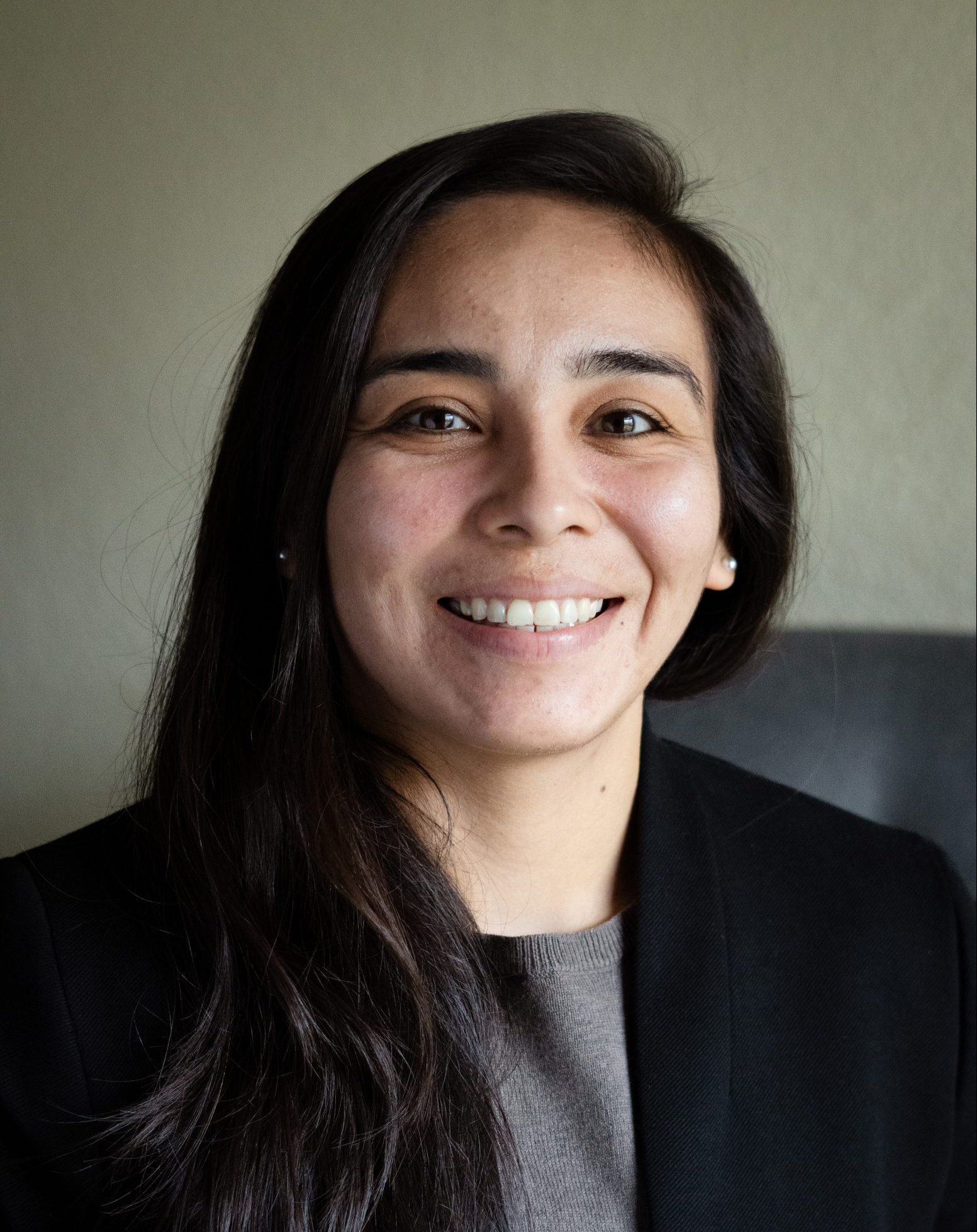
Debbie Duran, PG
Hometown: Eagle Pass
Education: University of Texas at San Antonio, B.S. in Geology
Profession: Booz Allen Hamilton, Senior Consultant

Looking back at herself as a 13-year-old, Debbie Duran can only shake her head and smile. As an Eagle Pass middle schooler, Debbie had never really heard of geology or the notion that you could study it in college. And like most of her classmates, she had never been on a plane or traveled outside the state of Texas.
Then came GeoFORCE.
“It opened a whole new world. We were being spoken to in a different language — shown a different lens to view the world (through),” she said. “I wouldn’t be where I am right now had they not planted that seed in 2005.”
That seed grew into a love for and career in geology. Like many students, Debbie went on the GeoFORCE trips because they sounded like a great adventure and an opportunity to explore new places. But after the outings to the Pacific Northwest between her junior and senior years of high school, it all clicked, and she never looked back.
1,708
students have completed the GeoFORCE program since 2005.
GeoFORCE is active in
24
counties across Texas.
After high school, Debbie went to The University of Texas at San Antonio, where she majored in geology. During the summers, she would return to GeoFORCE as a counselor for the Southwest and Houston cohorts and the Alaskan offshoot.
She considered graduate school after completing her undergraduate degree in 2013 but landed a job as a staff geologist at Talon/LPE, an environmental consulting firm. From there, she moved on to SWCA Environmental Consultants, where she worked as a geologist in training under a professional geoscientist. Debbie’s career would eventually take her to the San Antonio Water System, where she worked in the resource protection department as an environmental specialist. And in 2022, she reached a milestone and obtained her professional geoscientist license from the State of Texas.
This was one of the proudest moments in her professional career. And in a fitting tribute to GeoFORCE, she reached out to then-Associate Director Eleanour Snow to thank her and the program for their role in shaping her future. Debbie is now at management and technology consulting firm Booz Allen Hamilton, where she focuses on environmental work as a senior consultant.
Two decades later, the memories of her experiences with GeoFORCE as a teenager still burn brightly. She said she can vividly remember “that distinct Jester smell,” referring to her time on the Forty Acres in the aging Jester Center dorms that have served generations of Longhorns and visitors. And she will still occasionally during her work refer to a textbook by Professor Leon Long, who led some of her first field outings in GeoFORCE and introduced her to a future of hard and rewarding work in geology. That work has paid off both professionally and personally, she said.
“You have to have patience. You have to have tenacity. You have to have rigor. You have to want it. But it’ll pay off,” Debbie said. “I think the most satisfying part for me is being able to help my family. That’s priceless. All of the hard work has paid off. And it all started with GeoFORCE.”
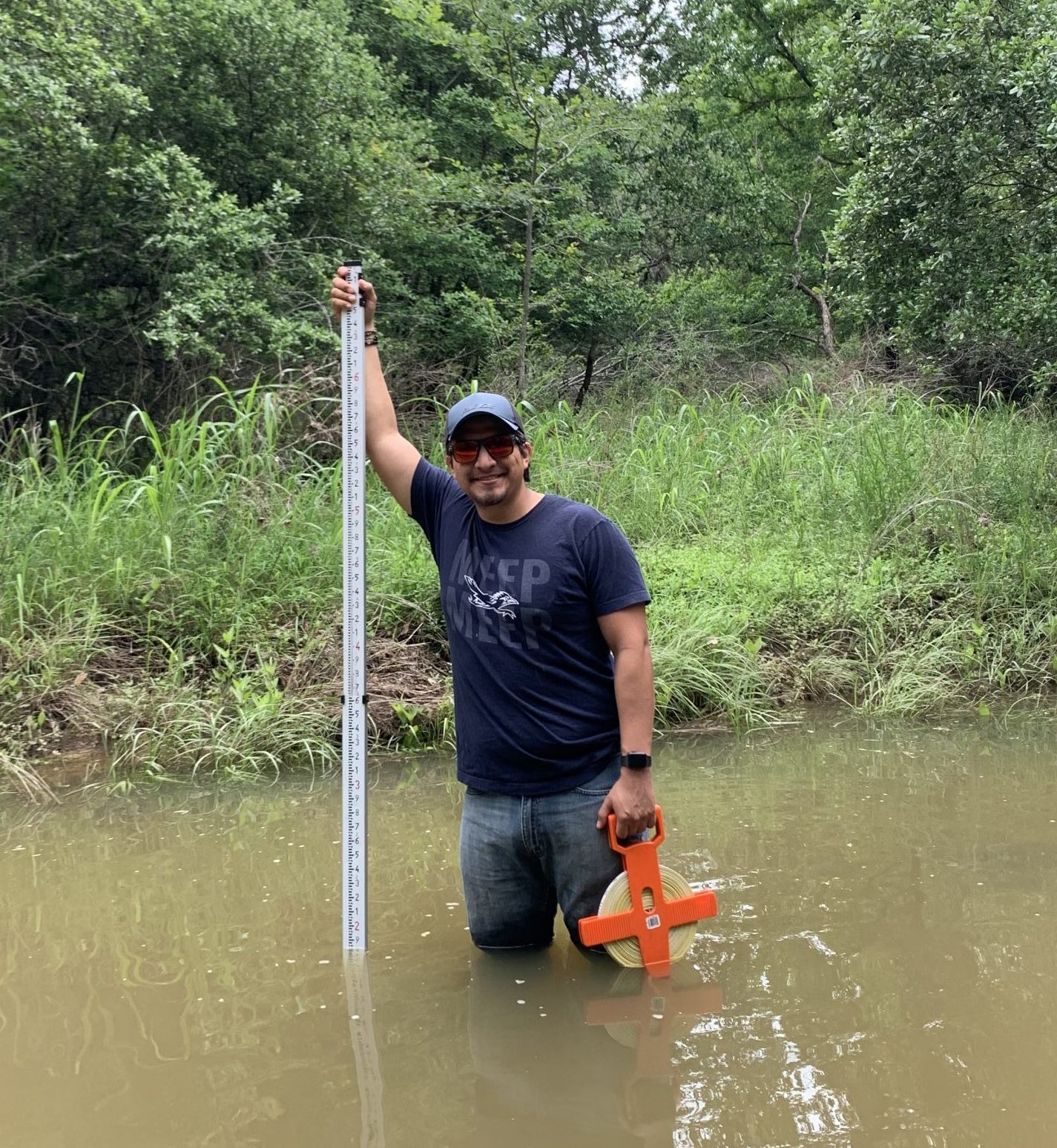
Felipe Villanueva
Hometown: Uvalde
Education: Texas A&M-Corpus Christi, B.S. in Environmental Sciences: Marine and Coastal Resources; University of Texas at San Antonio, M.S. in Environmental Science
Profession: University of Texas at San Antonio, Chemical Safety Specialist

Among the clutter on Felipe Villanueva’s desk is a square piece of stone about the size of a Rubik’s Cube. It looks like a paperweight, but it has a much stronger meaning to Felipe, who has carried it around since his high school days.
“It’s a piece of limestone from Florida,” he said of his prized keepsake from his time in GeoFORCE. “The final year, we had the final test. I think I had the highest score. It was like, ‘Do well and you get a rock.’”
Sounds about right for a program that introduces teenagers to geological wonders and geology as a science.
These days, 20 years removed from his introduction to GeoFORCE, Felipe is a chemical safety specialist at The University of Texas at San Antonio. After finishing Uvalde High School, he attended Texas A&M-Corpus Christi, where he received a bachelor’s in environmental science. From there, he took a job as an academic lab technician at San Antonio College and eventually pursued and completed a master’s degree at UTSA while working full time.
In 2015
GeoFORCE received the Presidential Award for Excellence in Science, Mathematics and Engineering Mentoring from
President Barack Obama
Felipe grew up as a Longhorn fan, so when his eighth grade science teacher first mentioned GeoFORCE, the association with UT immediately caught his interest. But when he first brought the opportunity home, his mother balked. She didn’t like the idea of her 13-year-old son being away from home. His dad, also an avid Longhorn fan who spent a lifetime pushing education on his children, had a different reaction.
“My dad said, ‘Go do it because these opportunities don’t come by that often,’” Felipe said. “Being involved with UT was the biggest thing. For my family, being asked by a university of that caliber was a big deal — a family honor.”
Two decades later, Felipe remembers the adventure and exacting nature of the program. Early mornings, long bus rides, many lectures and enough granola bars to turn a person off them for a lifetime.
“We hit the ground running. It was a crash course in geology, and I don’t think any of us expected that,” he said. “We were just mentally and physically drained by the end of it.”
But he loved it. He still has his original GeoFORCE lanyard in addition to the limestone prize, and said he still checks the program’s website to keep up with its accomplishments. And he still, occasionally, thinks about the geology lessons. They came flooding back to him when doing fieldwork for a master’s in environmental science.
“It was a lot of getting hit in the face with tree branches and stuff like that. And then I was like, ‘Oh, look, columnar joints,’” he said.
Felipe has simple advice for any young person thinking about applying.
“Just do it,” he said. “Go see the rest of the country and just have those experiences. It’s kind of a once-in-a-lifetime opportunity.”
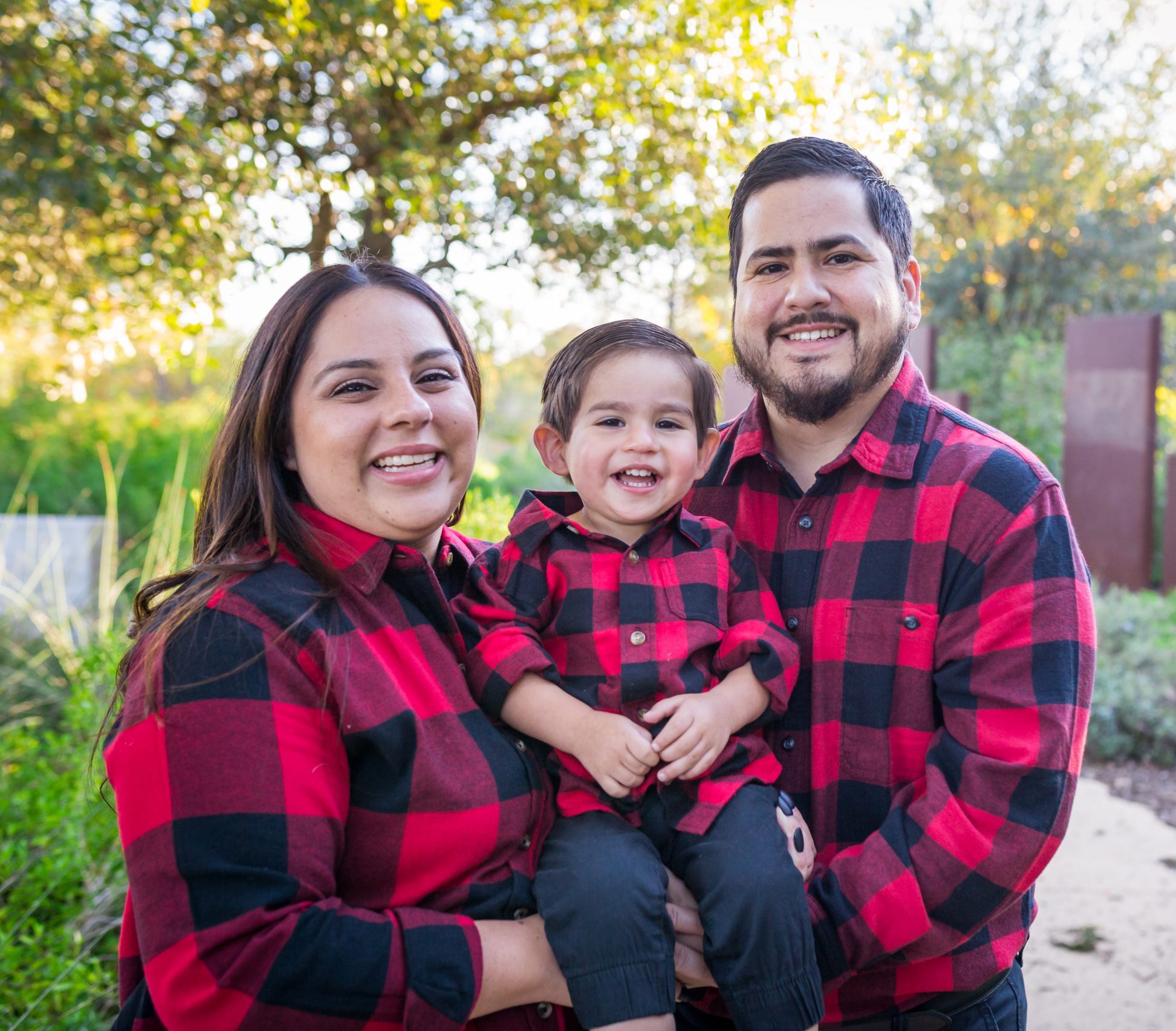
Isaac Jimenez
Hometown: Eagle Pass
Education: UT Jackson School of Geosciences, B.S. in Geology
Profession: Environmental Scientist

Going from a small Texas border town to a mammoth university like The University of Texas at Austin is a potentially daunting adjustment for any young person. But Isaac Jimenez had an ace in the hole when he left Eagle Pass for the Jackson School of Geosciences in 2009.
Like several of his classmates, Isaac had spent four years in the GeoFORCE program, traveling the country and learning the geosciences from some of the best in the field.
GeoFORCE unquestionably sparked his decision to enter the Jackson School and pursue a career in geology and environmental sciences. But beyond that, it created a ready-made support group to help him succeed when he showed up on the Forty Acres.
“A lot of people that were in GeoFORCE went to UT, and we all kind of stuck together,” he said.
The support was a big deal. He leaned heavily on his friends and then-GeoFORCE Associate Director Eleanour Snow. She helped him land a job as a lab technician at the University of Texas Institute for Geophysics, where he got to work alongside graduate students. Snow also mentored him all through college and even afterward, helping with professional contacts and offering career advice.
GeoFORCE students have earned a total of
782
bachelor’s degrees
116
master’s degrees
203
associate degrees
16
doctoral and law degrees.
“College is hard, and it’s not just the school stuff,” he said. “She would help out with anything.”
Two decades after first entering GeoFORCE, Isaac is an environmental scientist with Versar, where he has been for nearly nine years. He envisioned himself entering the oil and gas industry when he came out of college, particularly after a summer internship with Lewis Energy in San Antonio that he landed with the help of some GeoFORCE contacts. But the market was in a downturn and jobs were scarce. So he did a short stint at the Texas Commission on Environmental Quality and then moved on to Versar, a construction project management company.
The career path is quite a transition for a teenager who had no idea what the geosciences were before GeoFORCE. Like most, Isaac was nervous when first stepping on that bus. But he said that the counselors made everyone comfortable and, most importantly, kept them busy with studying, tests and games.
And then there were the trips.
“They took us to the Grand Canyon,” Isaac said. “It’s like, yeah, I’ve seen this in a photo, but it’s right there!”
Isaac remembers the program as rigorous, but he said it paid off in both knowledge and — just as importantly — confidence.
“You just really had to pay attention. For a lot of kids that was the hard part,” he said. “But when I got to geology, I was like, ‘I’ve been studying this stuff for four years now.’”
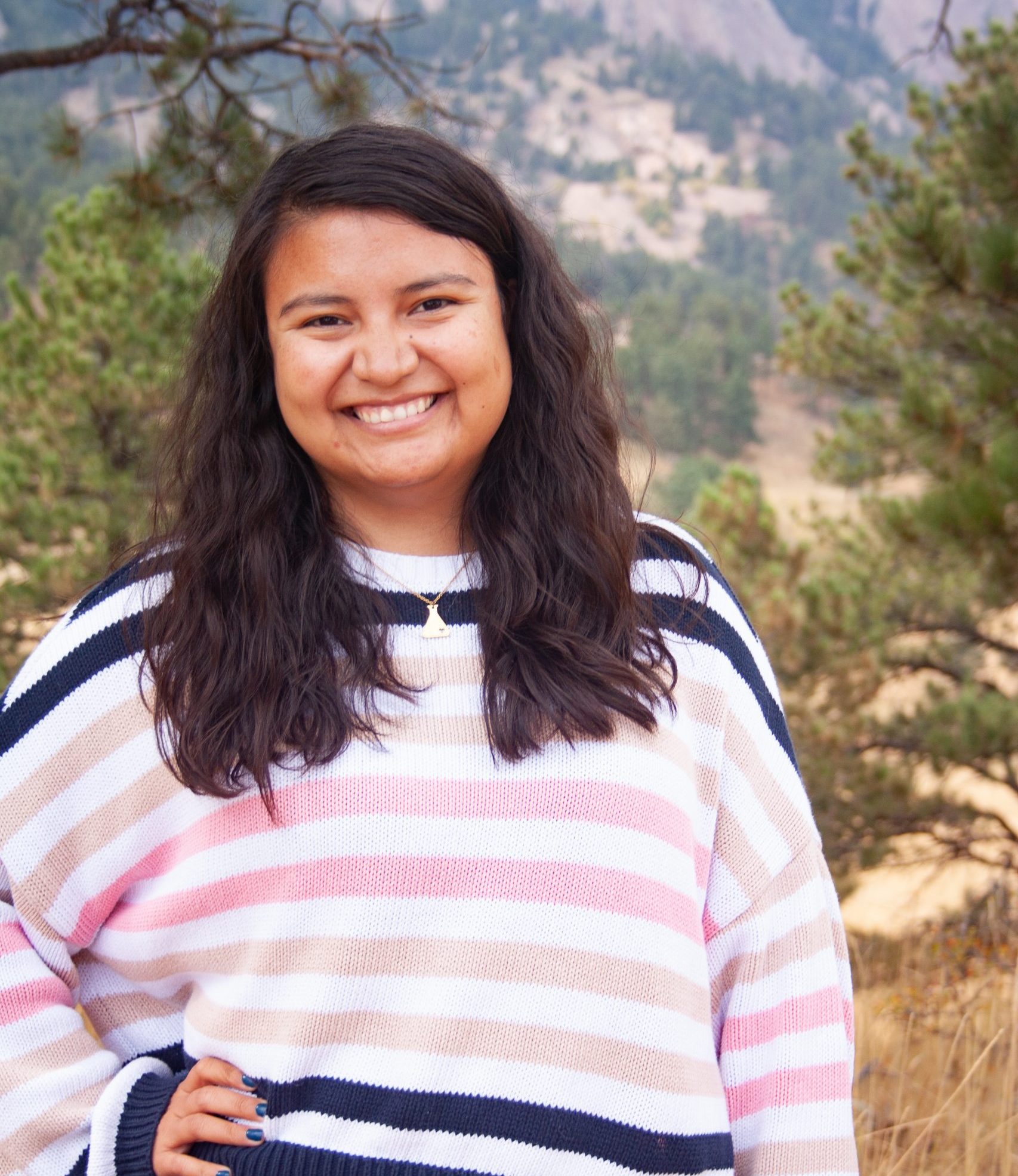
Marissa Vara
Hometown: Uvalde
Education: UT Jackson School of Geosciences, B.S. in Geology; Louisiana State University, M.S. in Geography-Paleoclimatology
Profession: The University Corporation for Atmospheric Research (UCAR), Higher Education Specialist

Marissa Vara remembers well the day in eighth grade that her pre-AP science teacher introduced the class to a new program that would take kids all over the country, teaching them geoscience by using some of the world’s most amazing natural wonders as living labs.
She went home and excitedly told her parents about the GeoFORCE program. Her dad had an immediate answer: “No.”
Though terribly disappointed, Marissa understood her father’s reaction.
“That’s the way it is with small-town Mexican American families,” she said. “That first summer, it was two weeks going away without a family member, and we don’t like to leave our children with strangers.”
Her mom had a different view. The program was free and offered tremendous opportunity for Marissa to grow and learn. Family conversations ensued. Dad relented, and Marissa was introduced to The University of Texas at Austin and the geosciences.
That first summer was a dizzying array of exhausting bus rides, hikes and lessons — and lots of fun. Marissa said she remembers Professor Leon Long lecturing on outcrops.
Since its start in 2005, GeoFORCE students have earned
91
bachelor’s degrees in geosciences
21
master’s degrees in geosciences
“It was very much like a freshman class at the Jackson School,” she said, laughing. “None of us knew what the heck we were doing.”
After the first year, the program evolved to provide students with more guidance, and the lessons began to take shape in her mind. Then, in her third-year summer trip to Oregon, it all came into focus.
“Suddenly, I was like ‘I can do this. I can be a geologist and actually connect the way the world works,’” she said.
Thanks to scholarships she obtained through GeoFORCE, Marissa was able to attend UT. The transition was difficult, as it was for most of the five GeoFORCE students who entered the Jackson School that year. But the now-bonded group, with the help of GeoFORCE mentors, pushed through.
“We depended on each other a lot to help each other study, to help motivate each other to move forward,” she said.
GeoFORCE would shape every aspect of Marissa’s professional life from then on. She worked there every summer and was able to leverage contacts, such as mentor Eleanour Snow, to attend graduate school. It was during that time she realized academia was not the right professional fit, but that educational outreach might be. She sought the advice of then-GeoFORCE Director Samuel Moore, who welcomed her back as an educational observer to see how the program really worked.
From there, her path was set. She has since forged a successful career with the National Science Foundation, working for programs to broaden participation and help inspire kids much like herself. And this past summer back in Uvalde, in a “full circle moment for her family,” her nephew started his third year with GeoFORCE, the Oregon trip.
“I think it’s crucial for the rural communities to have something like this,” Marissa said. “They feel seen and heard from something big like the University of Texas, and that’s huge.”
The University of Texas at Austin
Web Privacy | Web Accessibility Policy | Adobe Reader


